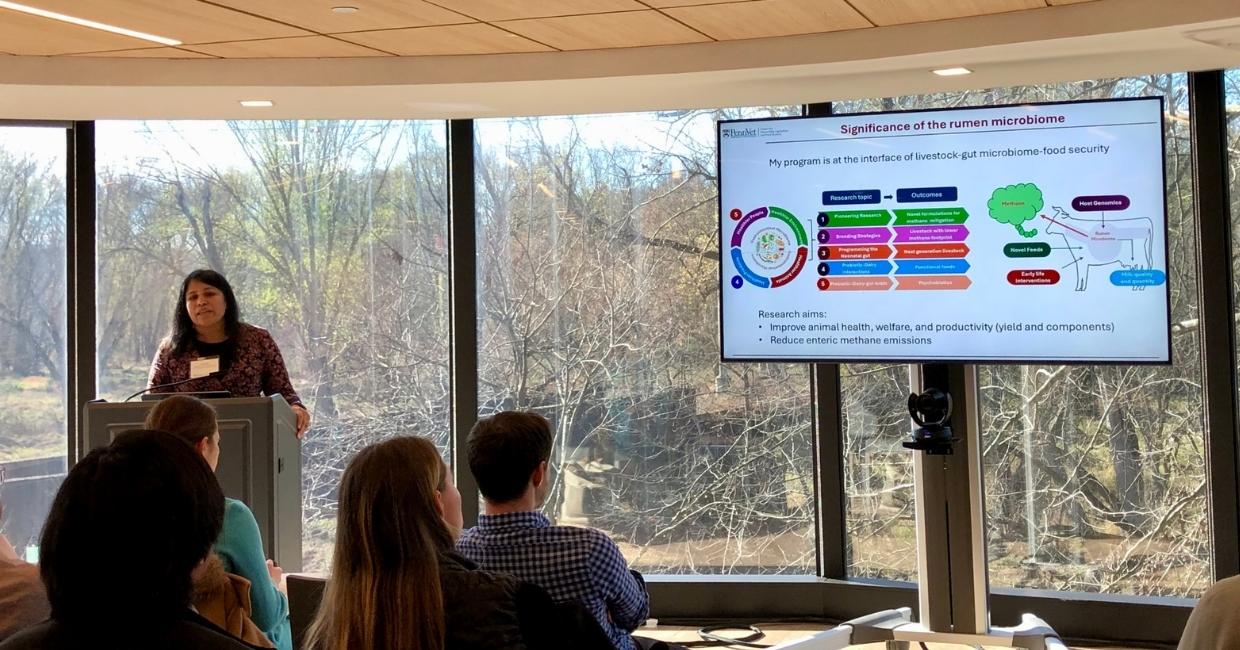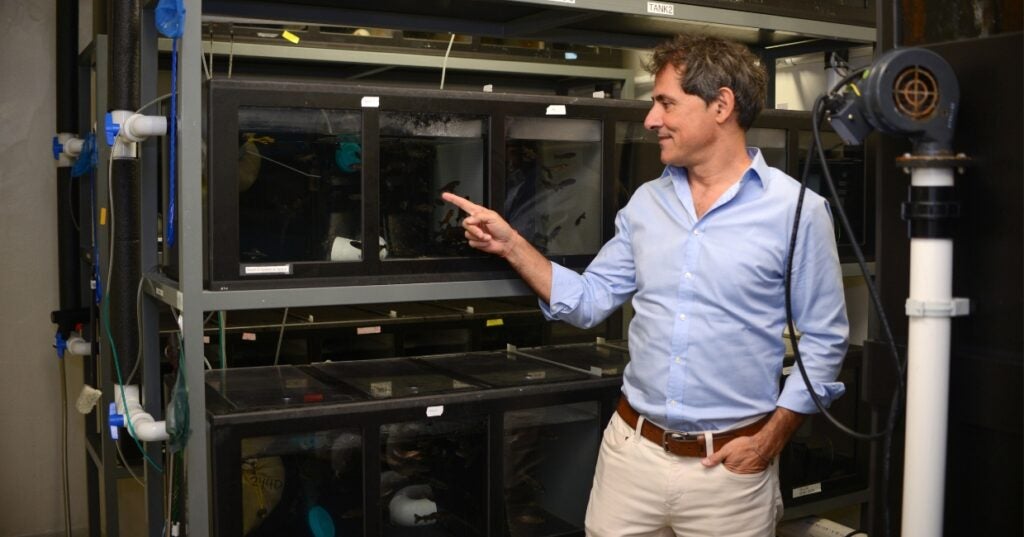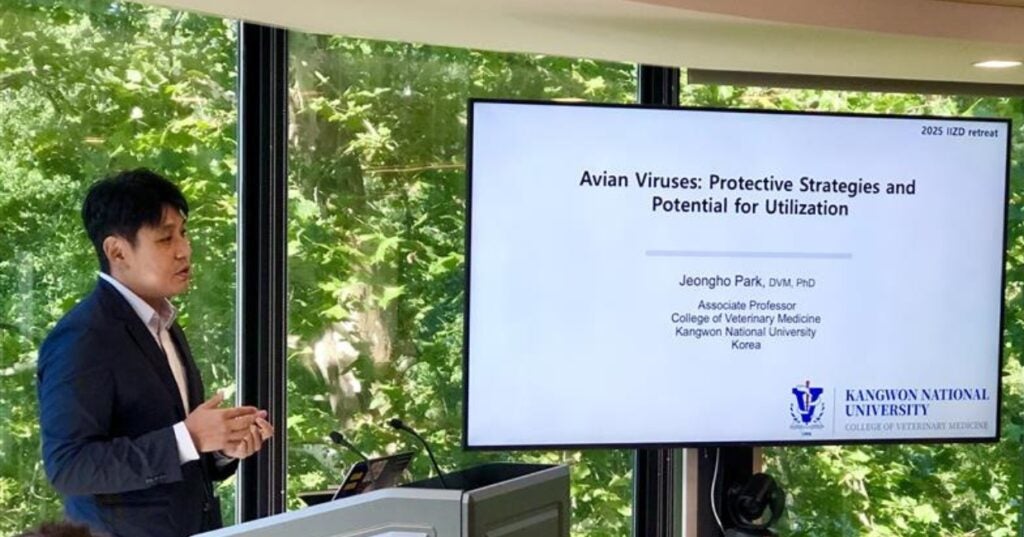Penn Vet’s Institute for Infectious and Zoonotic Diseases Hosts Inaugural Fall Research Retreat

Faculty In This Story
Event Sparks Synergies to Advance Investigation and Prevention of Emerging and Reemerging Diseases
The University of Pennsylvania (Penn) School of Veterinary Medicine’s (Penn Vet) Institute for Infectious and Zoonotic Diseases (IIZD) hosted its inaugural research retreat on November 15 in Chadds Ford, Pa. The retreat gathered more than 50 leading infectious disease experts, students, fellows, and key stakeholders from Penn Vet, Children’s Hospital of Philadelphia (CHOP), and the Perelman School of Medicine (PSOM).
The event aligned with the mission of the IIZD to expand research of infectious agents and advance ability to react to new diseases — both locally and globally — for the benefit of populations and communities. The IIZD retreat featured an array of activities, including a keynote lecture, species-specific short talks, breakout discussions, and an overview of available data science and diagnostic tools, all designed to foster interdisciplinary collaboration. It was organized by Julie Ellis, associate director of IIZD, Michael Hogan, assistant professor of pathobiology, and Laurel Redding, associate professor of epidemiology.
“This retreat exemplifies our commitment to advancing research and innovation through collaboration and dialogue,” said Christopher Hunter, director of the IIZD. “The investigations presented today, and the relationships kindled here, will drive impactful progress in immune health on a macro level, and more specifically on developing diverse strategies to deal with current challenges and new outbreaks when they occur.”
Christopher Hunter, director of the IIZD
Highlights of the retreat included:
Keynote Address: The keynote address was delivered by Scott Hensley, professor of microbiology at the Perelman School of Medicine and principal investigator of Penn’s Center of Excellence for Influenza Research and Response (CEIRR). His talk, “The Penn | CEIRR Response to Clade 2.3.4.4b H5N1 Viruses: A One Health Approach,” sparked discussion about the global threat of an H5N1 pandemic, the ability of influenza viruses to reassort gene segments, and the likely path of H5N1 transmission among dairy cattle.
Species Showcase: Penn Vet faculty members gave short talks on topics relevant to understanding infectious diseases across a variety of animal species:
- Stephen Cole, assistant professor of clinical biology, on antimicrobial resistance in domestic animals.
- Erick Gagne, assistant professor of wildlife disease ecology, on pathogen transmission dynamics in wildlife.
- Joy Tomlinson, assistant professor of large animal medicine, on single-cell sequencing and the pathology of equine parvovirus hepatitis.
- Dipti Pitta, associate professor of ruminant nutrition, on mitigating salmonella in dairy herds.
- Meghann Pierdon, assistant professor of clinical production medicine, on the spatial analysis of disease in the poultry and swine industries.
The retreat provided an invaluable platform for participants to build connections and forge partnerships across the spectrum of infectious disease research, from parasitology and epidemiology to bioinformatics and clinical medicine.
“The energy and enthusiasm around the research retreat has been particularly inspiring, and it is a testament to the incredible collegiality of our infectious disease colleagues from across Penn,” Ellis said. “The momentum we’ve gained here today will propel our community toward revolutionary advancements to tackle global health challenges.”
Launched in 2021, the IIZD was founded at a time when the COVID-19 pandemic underscored the threat of zoonotic diseases and the power of basic and translational research. Since its inception, IIZD has awarded $3.6 million in grants to support pilot studies, pre- and post-doctoral fellowships, and faculty recruitment.
Related News

Behind the Breakthroughs: J. Oriol Sunyer
J. Oriol Sunyer explores how studying the evolution of the immune system reveals surprising connections between fish and human immunity, and what these discoveries could mean for the development of…

Penn Vet’s Institute for Infectious and Zoonotic Diseases Hosts Second Annual Research Retreat
The University of Pennsylvania (Penn) School of Veterinary Medicine’s (Penn Vet) Institute for Infectious and Zoonotic Diseases (IIZD) hosted its annual Faculty Research Retreat on September 3 at the Brandywine…

A New Study from Penn Vet Reveals an Unsung Immune Defender as a Key Guardian of Gut Health and Metabolism
A pioneering new study published in Nature Microbiology, led by Oriol Sunyer, PhD, and a team of researchers at Penn Vet and the University of New Mexico, have uncovered a…
About Penn Vet
Ranked among the top ten veterinary schools worldwide, the University of Pennsylvania School of Veterinary Medicine (Penn Vet) is a global leader in veterinary education, research, and clinical care. Founded in 1884, Penn Vet is the first veterinary school developed in association with a medical school. The school is a proud member of the One Health initiative, linking human, animal, and environmental health.
Penn Vet serves a diverse population of animals at its two campuses, which include extensive diagnostic and research laboratories. Ryan Hospital in Philadelphia provides care for dogs, cats, and other domestic/companion animals, handling more than 30,000 patient visits a year. New Bolton Center, Penn Vet’s large-animal hospital on nearly 700 acres in rural Kennett Square, PA, cares for horses and livestock/farm animals. The hospital handles more than 6,300 patient visits a year, while our Field Services have gone out on more than 5,500 farm service calls, treating some 22,400 patients at local farms. In addition, New Bolton Center’s campus includes a swine center, working dairy, and poultry unit that provide valuable research for the agriculture industry.






